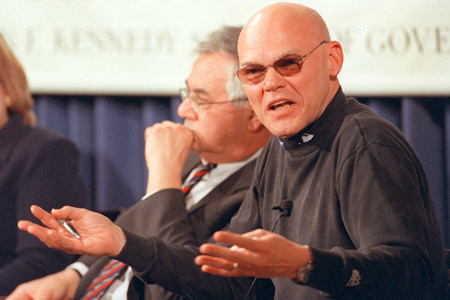Democrats talk tough – and funny

One of the main disadvantages facing the Democratic Party today is that it has lost its bully pulpit, said U.S. Rep. Ellen Tauscher, D-Calif.
That may be true, but judging from the forceful opinions of the four Democratic leaders who spoke March 8 at a Kennedy School forum on “The Future of the Democratic Party,” the Democrats will certainly know what to do with the pulpit once they get it back. Until then, they will have to content themselves, as they did last Friday, with preaching to the choir.
Beside Tauscher, the forum, sponsored by the Institute of Politics, included Democratic political strategist James Carville, Massachusetts Rep. Barney Frank, and Democratic Leadership Council founder Al From. David Nyan, former columnist and associate editor of the Boston Globe, was moderator.
Carville started the sparks flying with his answer to Nyan’s question: “How would you compare the Whitewater investigation with the current investigation of the Enron collapse?”
Carville accused the Republican leadership of trying to promote a simplistic story to explain what went on at Enron and accused the Republican Congress of making Enron possible by failing to close the legal loopholes that the company took advantage of.
Alluding to the money independent counsel Kenneth Starr spent trying to convict President Clinton, Carville said: “It took $70 million to find a grown man acting stupid at the office and lying about it. It seems to me we can spend at least as much trying to find out how a $90 billion company went bankrupt.”
Frank responded with an emphatic “No!” to Nyan’s question, “Are the Democrats suffering from lack of leadership?”
What might be perceived as a lack of leadership is simply characteristic of the party out of power, he said. While admitting that the Democrats tend to be less cohesive than the Republicans, he contended that the Democrats are more unified now than at any time since Woodrow Wilson. The difficulties they face are due to the popularity of President Bush and the media’s lack of interest in covering substantive stories.
“People say to me, ‘Why don’t you say such and such?’ I tell them, I did say it, but I didn’t call anybody names, I didn’t call for anyone to be indicted, so no one paid attention.”
Tauscher added that in effect, Democratic representatives have been gagged as a result of patriotic fervor over the war on terrorism.
“The Republicans have a theology-based way of doing things,” she said. “If you don’t agree, you’re evil.”
From was asked whether he thought the party had been hurt by the Clinton scandals. He responded by disputing the premise of the question, asserting that Clinton had been extremely effective in bringing the party back to its core values of equal opportunity, inclusion, civic responsibility, and economic opportunity. He said that the scandals were due to individual failures and not to the party and that they were outweighed by the benefits that the Clinton-Gore administration had brought.
“If we had had this discussion in 1991, we would have said, ‘Where’s the voice of the Democratic Party?’ I predict that in another two years, we’ll have another strong presidential candidate.”
Carville added that, as far as criminal activity goes, the record speaks for itself. During Ronald Reagan’s eight years in office, 30 people from the administration were convicted of crimes, compared with only one under Clinton, Carville said.
“Our problem is we’re just not tough enough. They just run over us as if we weren’t there sometimes. The American people will not trust a party to defend America that will not defend itself,” Carville said.
From remarked on the parity that has characterized American politics for the past decade, with Congress almost equally divided and the last three presidential elections resulting in no clear majority.
He predicted that under such circumstances, the Republicans’ cultural conservatism will eventually prove their undoing because the majority of Americans are more in tune with the Democrats’ centrist positions.
“If we have growth-oriented economic policies and we remain centrist in our social agenda, we’ll be the majority party,” he said.
Frank remarked on the misconception in some quarters that there is little difference between the two major parties. He said that that perception has contributed to many young people’s lack of interest in politics.
“American political parties haven’t been this sharply divided since the Civil War, and back then, even though they were shooting at each other, they probably agreed on more things than we do now,” Frank said.
“Young people have been told a lie,” added Carville. “The biggest lie was told by Ralph Nader when he said it didn’t matter who was president. We should not be afraid to articulate the differences between the parties.”
Later, during the question-and-answer period, a question about the Democrats’ failure to take credit for their accomplishments prompted another eloquent outburst from Carville on the subject of Al Gore and his tendency to distance himself from the Clinton record during his own presidential campaign.
“I think Al Gore is a fine person and a fine American, but, my God, man! Stand up and take credit for something! You don’t have to take the blame for the sex, but at least take credit for the job you’ve done.”




